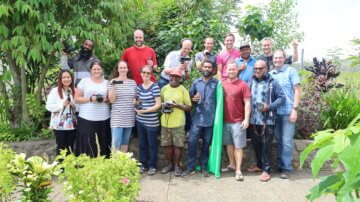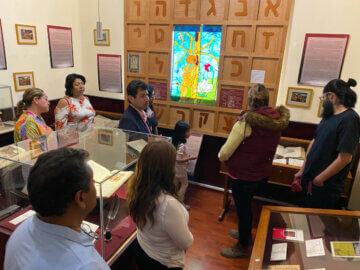Helpful Resources: Wycliffe World Day of Prayer – 11 November 2022
Prayer Exercises
Lectio Divina- Leader Guide
The outline below briefly describes how to lead a time of Lectio Divina, a form of meditative prayer. (For more details on what Lectio Divina is and how to do it see this resource from 24-7 Prayer)
Lectio Divina can be done individually or as a group. In a group setting the leader/facilitator:
- welcomes participants, encourages them to make themselves comfortable and assures the group of confidentiality.
- gives an overview of the process and desired outcomes. (There are six sections in the process with plenty of time between each section to relax, hear from God and respond to him.)
- tells participants what materials might be helpful like a Bible, something to write with (or phone or I-pad).
- gives the approximate length of the session.
- assures them that there are no ‘right’ answers. The purpose is for us to spend time with God and his Word and listen to what he wants to say to us.
- directs participants to the chosen Scripture passage (Depending on the situation, the Scripture may be printed out or people can use their Bibles or devices to find the passage.)
- Leaves plenty of time between each section so that people can relax and hear from God.
1. Read part or all of Psalm 30
Invite the Holy Spirit to come and guide the group. Read the passage slowly, out loud if possible. Read it twice with one minute of silence in between. (Be careful not to rush the process.) Feel free to ask others to read it out loud to have a variety of voices.
2. Relish
The word ‘reflect’ could be used here also, but ‘relish’ better pinpoints the aim for this section. Meditating on the passage, invite the participants to savour one word or phrase that they have noticed more than others during the reading. Encourage them to write this word down and begin pondering what God might be saying to them. Ask, “How is this word speaking to your life?”
Group suggestion: After a moment of resting in the passage, encourage people in the group to simply say the word/phrase they noticed – nothing more and nothing less. As they do, encourage them to ponder what God might be saying to them or to the group (At this stage nobody speaks out anything more than one word or phrase.)
3. Re-read
Read the passage one more time.
4. Respond
Invite the group to speak out in prayer what they sense God is saying to them. Encourage them to tell him how they feel encouraged or challenged by what he is saying to them.Ask that the seed of his Word in their hearts would develop deep rooted truth that would lead to fruitfulness in their lives.
Group suggestion: Allow space for people to pray out short prayers, speaking out what God is saying through the particular passage.
5. Rest
Invite the group to simply take some time to allow God to wrap them in his love, and let the word he has given them rest on them.
Group suggestion: Encourage the group to simply rest in God’s presence together.
6. Resolve
Encourage individuals in the group to finish by articulating one way they might live out the word that has penetrated their hearts.
Group suggestion: Lead a time when participants can share with one another about how God is speaking to them personally or as a group. Ask them to consider what an appropriate response might be. Note and mention common threads that emerge as people share. End with prayer.
Psalm 30 NIV
1 I will exalt you, Lord,
for you lifted me out of the depths
and did not let my enemies gloat over me.
2 Lord my God, I called to you for help,
and you healed me.
3 You, Lord, brought me up from the realm of the dead;
you spared me from going down to the pit.
4 Sing the praises of the Lord, you his faithful people;
praise his holy name.
5 For his anger lasts only a moment,
but his favor lasts a lifetime;
weeping may stay for the night,
but rejoicing comes in the morning.
6 When I felt secure, I said,
“I will never be shaken.”
7 Lord, when you favored me,
you made my royal mountain[c] stand firm;
but when you hid your face,
I was dismayed.
8 To you, Lord, I called
to the Lord I cried for mercy:
9 “What is gained if I am silenced,
if I go down to the pit?
Will the dust praise you?
Will it proclaim your faithfulness?
10 Hear, Lord, and be merciful to me;
Lord, be my help.”
11 You turned my wailing into dancing;
you removed my sackcloth and clothed me with joy,
12 that my heart may sing your praises and not be silent.
Lord my God, I will praise you forever.
Other Resources
Many prayer resources are available on wycliffe.net and can be shared and used during the Day of Prayer (and all year long!). These include prayer items, videos and prayer guides.
- Streams of Prayer: A weekly posting of seven current, strategic prayer requests in various languages.
- How to pray for teams working in Sign Language Bible Translation
- How to pray for Oral Bible Storytelling
- How to pray for a Translation Consultant
- How to pray for an increase in Old Testament translation
Additional prayer resources can be found at the following websites:
Pray for ZERO is launching a new website due before 11 November. The current website has some excellent downloadable prayer guides.
Find more prayer videos at:
Pray for Alliance organisations: These prayer pages give informative ideas as you pray for organisations involved in the Bible translation ministry.
Other stories:
- The Challenges and Blessings of Pandemic
- Paving the Path
- Ukraine Response: Wycliffe Hungary
- Ukraine Response: Wycliffe Romania
- Ukraine Response: Wycliffe Slovakia
- Ukraine Response: Wycliffe Poland
- Ukraine Response: Slovakia serves forgotten refugees
- Setting the Table
Click to return to:
The latest
View all articles
03/2024 Pacific: Papua New Guinea
Informing, teaching, inspiring: PNG workshop teaches video storytelling for language communities
PNG workshop teaches video storytelling for language communities
Read more
02/2024 Global
Looking ahead at 2024
As the year unfolds, we marvel at the work of God in our rapidly changing world. And, we look forward to a number of gatherings and conversations intended to draw us together.
Read more
01/2024 Americas
Telling the Bible's Story
It may come as a surprise that a museum is among the Wycliffe Global Alliance organisations.
Read more